TL;DR
Chatbots are great for simple, rule-based conversations, but they stop at replies. AI agents go further as they think, learn, and act across systems. This guide breaks down the difference between chatbots, AI agents, voice assistants, and intelligent virtual assistants, with real-world use cases, tech breakdowns, and when to use which one.
Introduction - Why the Difference Matters
With AI powering more business operations, teams are now choosing between chatbots, AI agents, virtual assistants, and AI-powered workflows. But as the tech stack evolves, so does the confusion.
Many still use these terms interchangeably, leading to poor tooling decisions and missed opportunities. A chatbot might work for handling basic queries, but when your business needs dynamic decision-making and real task execution, an AI agent could be the better choice.
This blog explains what chatbots and AI agents actually are, how they work, and why understanding the difference matters for customer experience, automation goals, and scaling support operations.
The Evolution of AI in Digital Interaction
The artificial intelligence landscape is experiencing unprecedented growth, with the global AI agents market projected to reach $7.6 billion in 2025, up from $5.4 billion in 2024, representing a remarkable 45% compound annual growth rate through 2030. This explosive expansion is nearly double the growth rate of the more mature chatbot market, which is expanding at approximately 23% annually.
As 85% of enterprises plan to integrate AI agents in some form by the end of 2025, a critical question emerges: Should you choose an AI agent or a traditional chatbot? Understanding the distinction between these technologies is crucial for making informed decisions that align with your business objectives and customer experience goals.
Defining Chatbots

Chatbots are automated software programs designed to simulate human conversation through predefined rules, decision trees, and pattern recognition.
How Chatbots Work
- Natural Language Processing: Analyzes messages to identify keywords and intent
- Intent Recognition: Categorizes requests based on predefined categories
- Decision Trees: Creates branching pathways for conversation resolution
- Response Generation: Selects from pre-written response libraries
- Database Integration: Accesses customer information and business data
Rules-Based Systems
- Scripted Logic: Chatbots follow predefined rules and structured conversation paths.
- Decision Trees: User inputs trigger specific branches in a flowchart-like system.
- Keyword Matching: Bots rely on identifying preset keywords or phrases to respond.
- Predictable Outcomes: Interactions are consistent but limited to expected scenarios.
- Low Adaptability: Struggle with ambiguous questions or unexpected phrasing.
- Manual Updates Needed: Any new use case requires manual rule creation and testing.
Applications of Chatbots in Business
- Customer Service: Account inquiries, order status, basic troubleshooting
- E-commerce Support: Product recommendations, order processing, returns
- Lead Qualification: Information collection, needs assessment, scheduling
Chatbots excel in handling high-volume, routine customer inquiries with standardized responses, making them cost-effective solutions for predictable customer service scenarios.
Book a Demo to understand how AI can be helpful for you.
Defining AI Agents
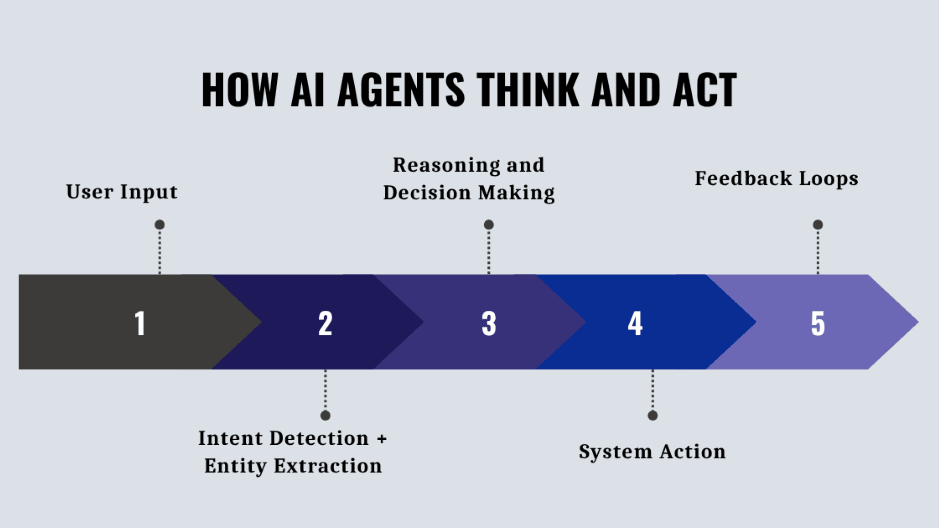
AI agents represent a significant evolution in automated customer interaction technology, leveraging advanced artificial intelligence capabilities to understand context, learn from interactions, and perform complex workflows.
How Do AI Agents Work?
- Advanced Natural Language Understanding: Comprehends intent, sentiment, and context
- Memory and Context Management: Maintains conversation history and preferences
- Sophisticated Decision-Making: Weighs multiple factors and considers outcomes
- Action Execution: Interfaces with external systems autonomously
- Continuous Learning: Adapts and improves from each interaction
Role of Large Language Models
Large language models serve as the cognitive foundation for modern AI agents, enabling
- Natural Language Understanding: Context comprehension and intent interpretation
- Response Generation: Dynamic content creation tailored to specific situations
- Reasoning and Analysis: Complex problem breakdown and multi-step planning
Platforms like Robylon demonstrate these capabilities, offering agentic AI solutions that automate customer support queries with 99% accuracy from day one. Book a Demo
Key Differences Between Chatbots and AI Agents
1. Level of Complexity and Adaptability
Traditional chatbots operate on rigid decision trees and predefined scripts. They’re designed to follow a fixed path, offering quick but often limited answers.
Chatbots
- Follow predetermined decision trees
- Provide predictable but limited responses
- Require manual updates for new scenarios
- Struggle with ambiguous requests
AI Agents
- Understand context and adapt to unique situations
- Generate novel solutions to unprecedented problems
- Learn and improve from each interaction
- Handle complex, multi-step workflows
2. Personalization and Contextual Awareness
Research from Talkdesk shows that AI agents' ability to interpret intent and engage in natural conversations can improve customer satisfaction by up to 120% compared to traditional systems.
AI Agent Advantages
- Maintains detailed customer preference profiles
- Adapts communication style to individual needs
- Provides proactive service based on patterns
- Builds relationships over time
3. Integration with External Tools
AI Agents can connect with multiple systems simultaneously, coordinating actions across platforms for end-to-end automation. Chatbots typically function as interfaces to existing systems with limited coordination capabilities.
4. Use Cases: Chatbots vs AI Agents
Choosing between a chatbot and an AI agent isn’t just a tech decision, it’s a strategic one. The right fit depends on the complexity of your workflows, the depth of customer interaction, and your scalability goals. Below, we outline common use cases for each to help clarify where they shine and where they fall short.
1. Chatbots for Routine Inquiries
Chatbots are most effective for handling high-volume, repetitive queries where accuracy and speed are prioritized over nuance. These are typically simple, transactional tasks that don’t require deep contextual understanding.
- FAQ Management: Chatbots excel at delivering instant answers to standard questions such as business hours, return policies, or contact details. They can deflect a significant portion of inbound queries, reducing support team workload.
- Order Management: Customers can check their order status, access tracking numbers, or make basic changes (like address updates) without needing human assistance.
- Account Services: Tasks like checking account balances, resetting passwords, or accessing billing history are ideal for chatbots, provided the interactions remain linear and well-defined.
2. AI Agents for Advanced Decision-Making
AI agents go beyond scripted responses. They reason, personalize, and act across systems, making them ideal for business-critical interactions that demand flexibility and a deep understanding of customer needs.
- Complex Support: When customers face technical issues or need to resolve multiple concerns in one interaction, AI agents can manage and escalate tasks intelligently. They can troubleshoot, probe for deeper context, and provide end-to-end solutions in real time.
- Sales Consultation: AI agents can qualify leads, recommend tailored products, and guide users through a personalized buyer’s journey based on preferences, past behavior, and needs analysis.
- Workflow Automation: From handling returns with conditional logic to coordinating multiple backend processes (like verifying identity or processing refunds), AI agents can automate multi-step workflows with minimal friction. They’re also capable of recognizing exceptions and escalating to human agents when necessary.
3. Sector-Specific Applications
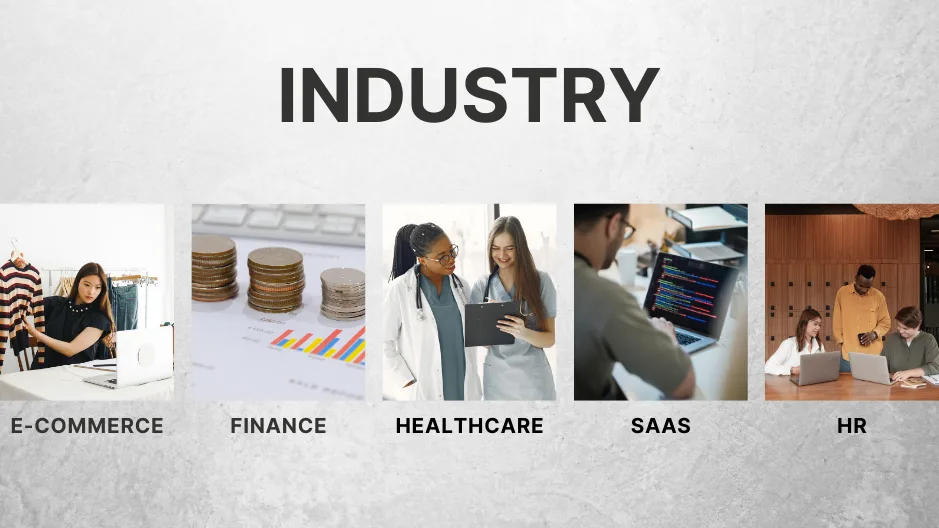
Different industries have unique customer expectations and operational challenges. While chatbots offer a quick fix for routine interactions, AI agents provide scalable, intelligent support that adapts to industry-specific needs. Here’s how each technology performs across key sectors
- Financial Services: Chatbots handle routine transactions; AI agents provide financial planning and fraud detection.
- Healthcare: Chatbots manage scheduling; AI agents offer symptom analysis and care coordination.
- E-commerce: Chatbots track orders; AI agents provide personalized shopping assistance.
- SaaS: Chatbots handle billing; AI agents offer technical support and implementation guidance
Benefits of Hybrid Approaches
While chatbots and AI agents have distinct strengths, the most forward-thinking organizations are adopting a hybrid model, leveraging both to deliver seamless, scalable support. This blended approach maximizes efficiency without sacrificing flexibility, allowing businesses to meet customer needs with precision.
1. Combining Simplicity with Adaptability
Hybrid systems allow companies to deploy chatbots for quick, repetitive tasks while reserving AI agents for more complex, nuanced interactions. This layered support model optimizes both cost and performance.
- Efficiency Where It Matters: Chatbots can instantly resolve common queries like order updates or password resets, reducing ticket volume and freeing up resources.
- Intelligence When It Counts: AI agents take over when the situation requires contextual awareness, dynamic problem-solving, or system-wide orchestration.
- Reduced Operational Load: Automating a broader spectrum of tasks, without relying solely on human agents, leads to faster resolution times and lower overhead.
This combination delivers the best of both worlds: the simplicity of scripted automation with the intelligence of adaptive AI.
2. Enhanced Customer Experience
Customers don’t care whether they are talking to a bot or an agent, they care about getting the right answer quickly. A hybrid model ensures the experience is smooth, accurate, and responsive from start to finish.
- Faster Resolutions: Routine issues are handled instantly by chatbots, while AI agents step in for personalized support, minimizing friction.
- Always-On Availability: Businesses can offer round-the-clock service without sacrificing quality, thanks to smart task routing between chatbots, AI agents, and human teams.
- Improved Satisfaction Scores: With fewer handoffs, smarter responses, and shorter wait times, customer satisfaction and brand loyalty naturally increase.
As businesses scale, a hybrid support strategy ensures agility without complexity. It's not just about automating support, it's about doing it intelligently. Hybrid approaches enable businesses to match technology capabilities to specific use cases while optimizing costs and performance.
Challenges in Implementing AI Solutions
1. Integration Costs and Technical Barriers
The technical complexity of integrating AI systems with existing business infrastructure represents one of the most significant implementation challenges organizations face today
- Infrastructure Requirements: Legacy system compatibility, data quality needs, security implementation
- Resource Investment: Development costs, maintenance requirements, staff training, performance monitoring
- Technical Expertise: AI knowledge, integration skills, data science capabilities, quality assurance
Many organizations underestimate the time and resources required for successful AI implementation. Data preparation alone can consume 60-80% of project timelines, as systems require clean, structured, and accessible data to function effectively. Additionally, change management becomes crucial as teams adapt to working alongside AI systems.
2. Maintaining Privacy and Data Security
Privacy and security considerations have become increasingly critical as AI systems handle more sensitive customer information:
- Data Governance: Comprehensive frameworks for data collection, storage, and processing.
- Regulatory Compliance: Adherence to GDPR, CCPA, and industry-specific regulations.
- Access Controls: Appropriate permissions and authentication systems.
- Audit Trails: Comprehensive logging and monitoring capabilities.
- Transparency Requirements: Explainable AI and decision documentation.
Organizations must balance the data access requirements of AI systems with privacy protection obligations and regulatory compliance requirements. This balance becomes particularly challenging in regulated industries where transparency and explainability are mandatory.
Future Trends in AI Interaction
Growing Role of AI Agents
The trajectory toward sophisticated AI agents is accelerating
- Market Growth: 82% of companies plan AI agent integration within the next few years
- Capability Expansion: Advances in LLMs enabling complex reasoning
- Multi-Modal Interfaces: Integration with voice and IoT technologies
Gartner research predicts chatbots will become the primary customer service channel by 2027, indicating a fundamental shift in customer interaction expectations.
Business Intelligence Implications
AI agents increasingly serve as sources of strategic insights
- Real-Time Analytics: Customer behavior identification, trend detection
- Strategic Decision Support: Journey optimization, market opportunities
- Operational Intelligence: Process efficiency, resource optimization
Which Should You Choose?
Choosing between chatbots, AI agents, or a hybrid approach depends on your business needs, customer expectations, and operational complexity.
1. Choose Chatbots
Chatbots are ideal for businesses that need efficient handling of large volumes of repetitive inquiries. They are budget-friendly and effective in straightforward, rule-based scenarios.
- High-volume routine inquiries dominate interactions
- Limited budget requires cost-effective solutions
- Predictable patterns align with rule-based approaches
- Simple service requirements don't need complex reasoning
2. Choose AI Agents
AI agents are the right fit when your business requires personalization, complex decision-making, and seamless system integration. They offer advanced capabilities that drive long-term customer value.
- Complex interactions require personalization
- Sophisticated problem-solving is essential
- Multi-system integration is needed
- Customer relationship building is a strategic priority
3. Hybrid Approach
In many cases, a combination of chatbots and AI agents delivers the best outcome. This approach balances cost efficiency with adaptability for complex use cases.
- Often optimal, combining cost-effective routine handling with advanced capabilities for complex scenarios.
Ready to explore AI solutions? Book a demo with Robylon to see how agentic AI can transform your operations.
Conclusion
The choice between AI agents and chatbots represents a strategic decision impacting customer experience, operational efficiency, and business growth. With the AI agents market reaching $7.6 billion in 2025 and 85% of enterprises planning implementation, early adopters gain competitive advantages through enhanced satisfaction and operational efficiency.
For organizations ready to embrace intelligent automation, Robylon offers enterprise-grade solutions that combine reliability with advanced capabilities. With 90% automation rates and 99% accuracy from day one, these platforms demonstrate practical AI agent value for modern business operations.
Organizations that understand these differences and make strategic technology choices position themselves for success in an increasingly AI-driven landscape, where intelligent automation becomes a competitive necessity rather than a luxury.
Ready to transform your customer support? Explore Robylon's solutions and discover how agentic AI can revolutionize your business operations.
FAQs
What industries benefit most from AI agents over chatbots?
Industries with complex requirements benefit most: healthcare (personalized care), professional services (consultation), SaaS (technical support), financial services (planning), and enterprise B2B (workflow automation).
Can chatbots use large language models like AI agents?
Modern chatbots can incorporate LLMs within constrained frameworks maintaining predictable behavior. However, they lack the full reasoning capabilities that characterize true AI agents.
Which is better for business: chatbots or AI agents?
The choice depends on requirements. Chatbots suit high-volume routine inquiries and limited budgets. AI agents excel at personalized service and complex problem-solving. Hybrid approaches often provide optimal results.
How do intelligent AI agents work compared to traditional chatbots?
AI agents use advanced natural language processing, machine learning, and generative AI for superior performance. They create original responses, coordinate across systems, and adapt behavior based on customer needs.
What is the difference between a chatbot and an intelligent agent?
Chatbots operate through predefined rules, providing consistent but limited responses. AI agents leverage large language models to understand context, learn from interactions, and generate dynamic responses for complex scenarios.

.png)



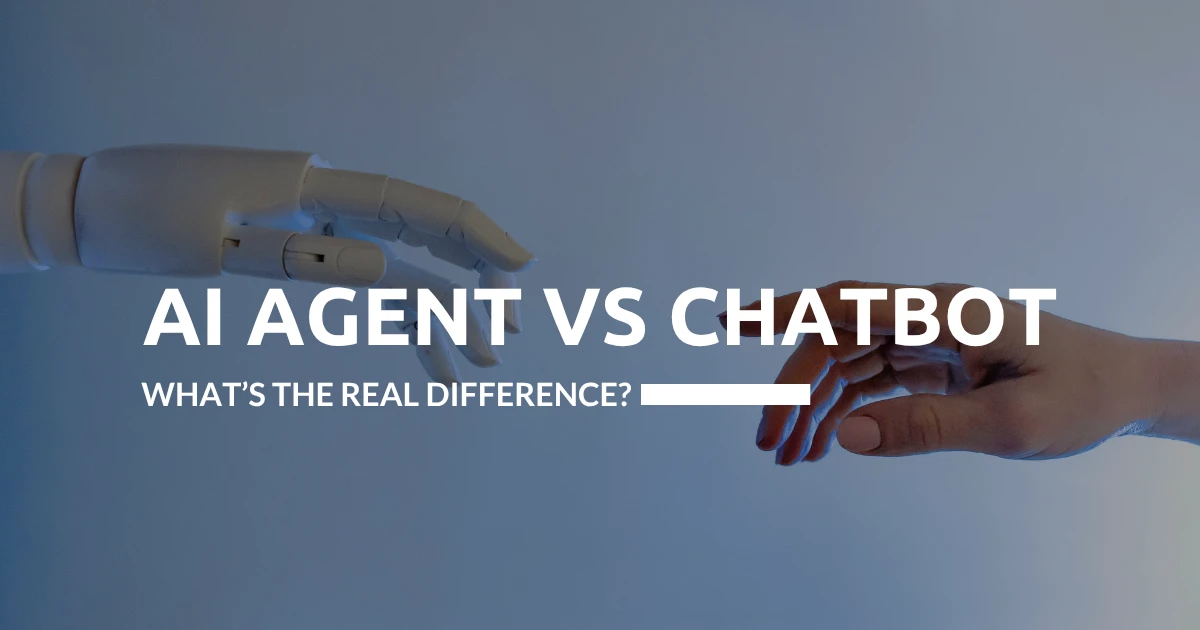

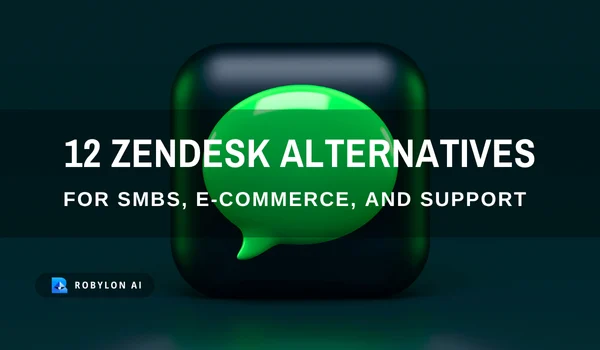
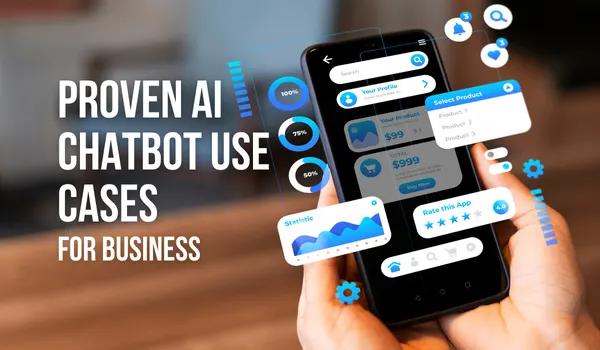
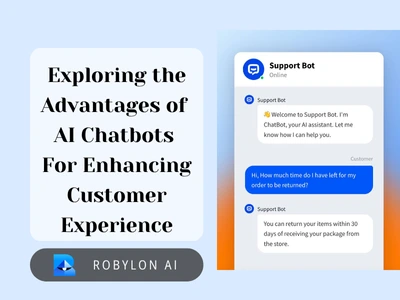
.webp)












